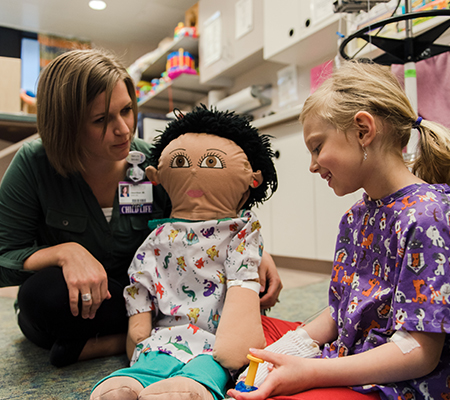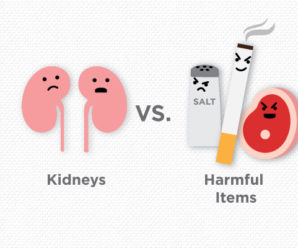
A hospital stay can be a very stressful time, not just for the patient involved but the entire family. At Marshfield Clinic Health System, certified child life specialists play a crucial role in reducing the fear, anxiety and pain for children and their families.
A common misconception is that child life specialists act as “babysitters” when children are hospitalized, but that doesn’t begin to cover the breadth of what these specialists do.
Sarah Houtman and Taylor Wilke, certified child life specialists at Marshfield Children’s, shared their day-to-day responsibilities and other aspects of their role.
Providing a diverse range of services
Illness, hospitalization and injury are just a few of the situations child life specialists help children and families navigate. They are deployed in many different areas of the hospital such as the emergency department, inpatient/outpatient surgery, pediatric intensive care unit (PICU), pediatrics, neonatal intensive care unit, urgent care and outpatient clinic areas. Child life specialists also support children of adult patients on a consult basis.
“Our role is to support children through their health care visit by preparing them for procedures, supporting them through the procedures, providing explanations about what to expect throughout the visit, and offering parent and sibling support,” Houtman said. “When we prepare children for procedures, we utilize developmentally-appropriate terminology, real medical equipment, teaching dolls, photos of places they will be, as well as provide sensory information to promote positive coping.”
Helping kids through a difficult time
When a child faces a potential long-term hospital stay, child life specialists prepare and support the young patient and their family. For example, if a child faces surgery, a child life specialist may use photos on an iPad, anesthesia masks and other medical equipment to familiarize them with the upcoming procedure.
Child life specialists also may use play doctor kits, medical play activities or CT/MRI models to further prepare children for a procedure.
Supporting children in a health care setting is not always procedure-based. “We provide play opportunities to help normalize the health care setting, as well as provide developmental play and stimulation to allow infants, toddlers and children to reach developmental milestones,” Wilke said. “As members of a multidisciplinary team, we set goals for each patient and use bedside or playroom activities to help meet these goals, but in a way that is fun and exciting. We also offer daily group activities to promote peer socialization and out-of-room activities.”
Child life specialists also provide support in bereavement situations and help kids cope with grief following the death of a family member.
“We facilitate memory building by making hand molds or impressions, ink hand prints, or guiding them through expressive activities,” Wilke said. “We also support family members by providing appropriate resources explaining how to have open, honest conversations with their children about losing a loved one and what behaviors to expect while they grieve.”
Certainly, there are many difficult situations child life specialists are thrust into, but the most important role they have is to support a child through their health care experience. It is part of what makes the job gratifying.
“Seeing a child overcome their fear of a medical experience is incredibly rewarding,” Houtman said, and Wilke agreed.
“When a child believes the experience is too difficult for them, we remind them just how capable they are,” Wilke said. “The smile on a child’s face after completing a successful procedure is the best thanks we can receive.”
Ask your Marshfield Children’s pediatrician about child life services when your child is undergoing a difficult procedure or is hospitalized.
Related posts
Children’s Miracle Network Hospitals makes miracles happen
Child Life specialists supports kids and families fighting childhood cancer







Leave a Reply